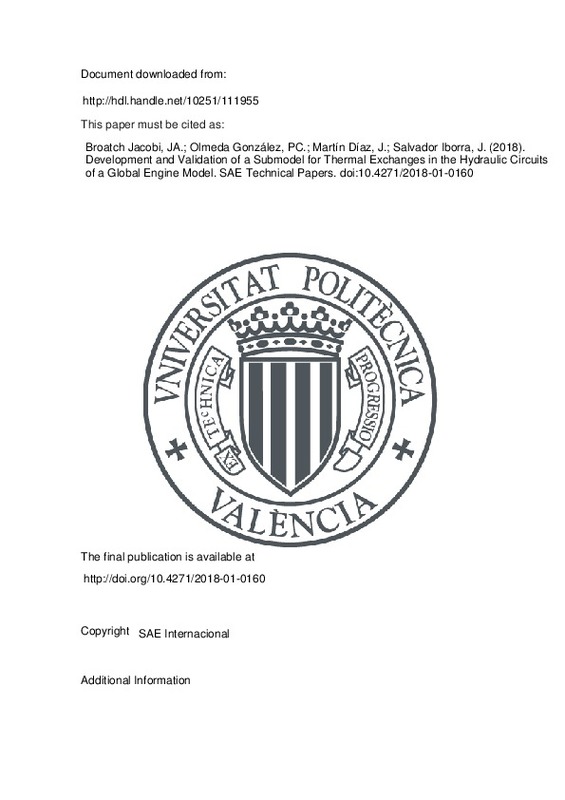JavaScript is disabled for your browser. Some features of this site may not work without it.
Buscar en RiuNet
Listar
Mi cuenta
Estadísticas
Ayuda RiuNet
Admin. UPV
Development and Validation of a Submodel for Thermal Exchanges in the Hydraulic Circuits of a Global Engine Model
Mostrar el registro sencillo del ítem
Ficheros en el ítem
| dc.contributor.author | Broatch, A.
|
es_ES |
| dc.contributor.author | Olmeda, P.
|
es_ES |
| dc.contributor.author | Martín, J.
|
es_ES |
| dc.contributor.author | Salvador-Iborra, Josep
|
es_ES |
| dc.date.accessioned | 2018-11-06T10:45:44Z | |
| dc.date.available | 2018-11-06T10:45:44Z | |
| dc.date.issued | 2018-04-03 | |
| dc.identifier.issn | 0148-7191 | |
| dc.identifier.uri | http://hdl.handle.net/10251/111955 | |
| dc.description.abstract | [EN] To face the current challenges of the automotive industry, there is a need for computational models capable to simulate the engine behavior under low-temperature and low-pressure conditions. Internal combustion engines are complex and have interconnected systems where many processes take place and influence each other. Thus, a global approach to engine simulation is suitable to study the entire engine performance. The circuits that distribute the hydraulic fluids -liquid fuels, coolants and lubricants- are critical subsystems of the engine. This work presents a 0D model which was developed and set up to make possible the simulation of hydraulic circuits in a global engine model. The model is capable of simulating flow and pressure distributions as well as heat transfer processes in a circuit. After its development, the thermo-hydraulic model was implemented in a physical based engine model called Virtual Engine Model (VEMOD), which takes into account all the relevant relations among subsystems. In the present paper, the thermo-hydraulic model is described and then it is used to simulate oil and coolant circuits of a diesel engine. The objective of the work is to validate the model under steady-state and transient operation, with focus on the thermal evolution of oil and coolant. For validation under steady-state conditions, 22 operating points were measured and simulated, some of them in cold environment. In general, good agreement was obtained between simulation and experiments. Next, the WLTP driving cycle was simulated starting from warmed-up conditions and from ambient temperature. Results were compared with the experiment, showing that modeled trends were close to those experimentally measured. Thermal evolutions of oil and coolant were predicted with mean errors between 0.7 °C and 2.1 °C. In particular, the warm-up phase was satisfactorily modeled. | es_ES |
| dc.description.sponsorship | This research has been partially funded by the European Union’s Horizon 2020 Framework Programme for research, technological development and demonstration under grant agreement 723976 (“DiePeR”) and by the Spanish government under the grant agreement TRA2017-89894-R. Josep SalvadorIborra was supported by Universitat Politècnica de València through the contract FPI-S2-2016-1357 of the program PAID01-16. The authors wish to thank Renault SAS, especially P. Mallet and E. Gaïffas, for supporting this research. Jaime Monfort San Segundo is acknowledged for his helpful collaboration in the code implementation | es_ES |
| dc.format.extent | 10 | es_ES |
| dc.language | Inglés | es_ES |
| dc.publisher | SAE Internacional | es_ES |
| dc.relation.ispartof | SAE Technical Papers | es_ES |
| dc.rights | Reserva de todos los derechos | es_ES |
| dc.subject.classification | MAQUINAS Y MOTORES TERMICOS | es_ES |
| dc.title | Development and Validation of a Submodel for Thermal Exchanges in the Hydraulic Circuits of a Global Engine Model | es_ES |
| dc.type | Artículo | es_ES |
| dc.type | Comunicación en congreso | es_ES |
| dc.identifier.doi | 10.4271/2018-01-0160 | |
| dc.relation.projectID | info:eu-repo/grantAgreement/EC/H2020/723976/EU/Diesel efficiency improvement with Particulates and emission Reduction/ | es_ES |
| dc.relation.projectID | info:eu-repo/grantAgreement/AEI/Plan Estatal de Investigación Científica y Técnica y de Innovación 2013-2016/TRA2017-89894-R/ES/METODOLOGIA PARA LA PREDICCION DE EMISIONES DE CO2 Y CONTAMINANTES DE UN MOTOR ALTERNATIVO/ | es_ES |
| dc.relation.projectID | info:eu-repo/grantAgreement/UPV//FPI-S2-2016-1357/ | es_ES |
| dc.relation.projectID | info:eu-repo/grantAgreement/UPV//FPI%2FS2-2016-1357/ | es_ES |
| dc.rights.accessRights | Abierto | es_ES |
| dc.contributor.affiliation | Universitat Politècnica de València. Instituto Universitario CMT-Motores Térmicos - Institut Universitari CMT-Motors Tèrmics | es_ES |
| dc.description.bibliographicCitation | Broatch, A.; Olmeda, P.; Martín, J.; Salvador-Iborra, J. (2018). Development and Validation of a Submodel for Thermal Exchanges in the Hydraulic Circuits of a Global Engine Model. SAE Technical Papers. https://doi.org/10.4271/2018-01-0160 | es_ES |
| dc.description.accrualMethod | S | |
| dc.relation.conferencename | WCX18: SAE World Congress Experience | es_ES |
| dc.relation.conferencedate | April 10-12, 2018 | es_ES |
| dc.relation.conferenceplace | Detroit, USA | es_ES |
| dc.relation.publisherversion | http://doi.org/10.4271/2018-01-0160 | es_ES |
| dc.type.version | info:eu-repo/semantics/publishedVersion | es_ES |
| dc.relation.pasarela | S\361028 | |
| dc.contributor.funder | Agencia Estatal de Investigación | es_ES |
| dc.contributor.funder | European Commission | es_ES |
| dc.contributor.funder | Universitat Politècnica de València | es_ES |







![[Cerrado]](/themes/UPV/images/candado.png)

